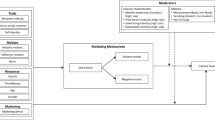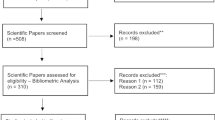Abstract
A lifestyle of voluntary simplicity, a type of consumer ethical behavior, is drawing increasing media attention. Consumers practicing voluntary simplicity tend to reduce material consumption in order to free up resources, primarily money and time, and to seek life satisfaction, fulfillment, happiness, and personal growth. The practice of voluntary simplicity is also relevant to resource conservation, ecological impact, and social responsibility. Understanding consumer motivations for adopting voluntary simplicity is thus a vital issue. This study examines the impact of human values and consideration of future consequences on voluntary simplifiers’ behavioral predispositions. Our findings show that individuals with self-enhancement values and openness-to-change values are less likely to engage in voluntary simplicity. Those with self-transcendence values and consideration of future consequences are more likely to be voluntary simplifiers. This study also finds that older people or those with a bachelor’s degree have a higher tendency to practice a simple living lifestyle. Finally, implications for researchers and marketing managers are discussed.

Similar content being viewed by others
References
Alexander, S., & Ussher, S. (2012). The voluntary simplicity movement: A multi-national survey analysis in theoretical context. Journal of Consumer Culture, 12(1), 66–86.
Bagozzi, R. P., & Yi, Y. (1988). On the evaluation of structural equation models. Journal of the Academy of Marketing Science, 16, 74–94.
Bagozzi, R. P., Yi, Y., & Phillips, L. W. (1991). Assessing construct validity in organizational research. Administrative Science Quarterly, 36(3), 421–458.
Ballantine, P. W., & Creery, S. (2010). The consumption and disposition behaviour of voluntary simplifiers. Journal of Consumer Behaviour, 9, 45–56.
Baumgartner, H., & Homburg, C. (1996). Applications of structural equation modeling in marketing and consumer research: A review. International Journal of Research in Marketing, 13(2), 139–161.
van Beek, J., Antonides, G., & Handgraaf, M. J. (2013). Eat now, exercise later: The relation between consideration of immediate and future consequences and healthy behavior. Personality and Individual Differences, 54, 785–791.
Bekin, C., Carrigan, M., & Szmigin, I. (2007). Beyond recycling: ‘Commons-friendly’ waste reduction at new consumption communities. Journal of Consumer Behaviour, 6, 271–286.
Belk, R. W. (1985). Materialism: Trait aspects of living in the material world. Journal of Consumer Research, 12, 265–281.
Boujbel, L., & d'Astous, A. (2012). Voluntary simplicity and life satisfaction: Exploring the mediating role of consumption desires. Journal of Consumer Behaviour, 11, 487–494.
Chang, H.-H., & Lu, L.-C. (2017). Actively persuading consumers to enact ethical behaviors in retailing: The influence of relational benefits and corporate associates. Journal of Business Ethics. https://doi.org/10.1007/s10551-017-3595-2.
Chang, W. L., Lu, L. C., Su, H. J., Lin, T. A., & Chang, K. Y. (2011). The relationship among consumer vanity trait, materialism and fashion anxiety. African Journal of Business Management, 5(9), 3466–3471.
Chowdhury, R. M. (2016). Religiosity and voluntary simplicity: The mediating role of spiritual well-being. Journal of Business Ethics. (in press).
Churchill Jr., G. A., & Iacobucci, D. (2005). Marketing research: Methodological foundations (9th ed.). Mason, OH: Thomson South-Western Press.
Collins, C. M., & Chambers, S. M. (2005). Psychological and situational influences on commuter-transport-mode choice. Environment and Behavior, 37, 640–661.
Cooper, D. R., & Schindler, P. S. (2007). Business research methods (9th ed.). New York: McGraw-Hill.
Craig-Lees, M., & Hill, C. (2002). Understanding voluntary simplifiers. Psychology & Marketing, 19(2), 187–210.
De Groot, J. I., & Steg, L. (2007). Value orientations and environmental beliefs in five countries: Validity of an instrument to measure egoistic, altruistic and biospheric value orientations. Journal of Cross-Cultural Psychology, 38, 318–332.
Dietz, T., Kalof, L., & Stern, P. C. (2002). Gender, values, and environmentalism. Social Science Quarterly, 83(1), 353–364.
Ebreo, A., & Vining, J. (2001). How similar are recycling and waste reduction? Future orientation and reasons for reducing waste as predictors of self-reported behavior. Environment and Behavior, 33(3), 424–448.
Elgin, D. (2010). Voluntary simplicity (2nd ed.). New York, NY: Harper.
Elgin, D., & Mitchell, A. (1977). Voluntary simplicity. Planning Review, 5(6), 13–15.
Fornell, C., & Larcker, D. F. (1981). Evaluating structural equation models with unobservable variables and measurement error. Journal of Marketing Research, 18(1), 39–50.
Gärling, T., Fujii, S., Gärling, A., & Jakobsson, C. (2003). Moderating effects of social value orientation on determinants of proenvironmental behavior intention. Journal of Environmental Psychology, 23(1), 1–9.
Gregg, R. B. (1936). The value of voluntary simplicity (3rd ed.). Wallingford, PA: Pendle hill.
Hair, J. F., Black, W. C., Babin, B. J., & Anderson, R. E. (2009). Multivariate data analysis (7th ed.). Upper Saddle River: Prentice Hall.
Hofstede, G., & Hofstede, G. J. (2005), Cultures and organizations: Software of the mind (2nd ed.), NY: McGraw-Hall.
Huneke, M. E. (2005). The face of the un-consumer: An empirical examination of the practice of voluntary simplicity in the United States. Psychology & Marketing, 22(7), 527–550.
Husted, B. W., & Allen, D. B. (2008). Toward a model of cross-cultural business ethics: The impact of individualism and collectivism on the ethical decision-making process. Journal of Business Ethics, 82(2), 293–305.
Hüttel, A., Ziesemer, F., Peyer, M., & Balderjahn, I. (2018). To purchase or not? Why consumers make economically (non-) sustainable consumption choices. Journal of Cleaner Production, 174, 827–836.
Irvine, W. B. (2006). On desire: Why we want what we want. New York, NY: Oxford University Press.
Iwata, O. (1997). Attitudinal and behavioral correlates of voluntary simplicity lifestyles. Social Behavior and Personality: An International Journal, 25(3), 233–240.
Iwata, O. (1999). Perceptual and behavioral correlates of voluntary simplicity lifestyles. Social Behavior and Personality: An International Journal, 27(4), 379–386.
Iwata, O. (2001). Attitudinal determinants of environmentally responsible behavior. Social Behavior and Personality: An International Journal, 29(2), 183–190.
Iwata, O. (2006). An evaluation of consumerism and lifestyle as correlates of a voluntary simplicity lifestyle. Social Behavior and Personality: An International Journal, 34(5), 557–568.
Iyer, R., & Muncy, J. A. (2009). Purpose and object of anti-consumption. Journal of Business Research, 62(2), 160–168.
Joireman, J., & Duell, B. (2005). Mother Teresa versus Ebenezer scrooge: Mortality salience leads proselfs to endorse self-transcendent values (unless proselfs are reassured). Personality and Social Psychology Bulletin, 31(3), 307–320.
Joireman, J. A., Lasane, T. P., Bennett, J., Richards, D., & Solaimani, S. (2001). Integrating social value orientation and the consideration of future consequences within the extended norm activation model of proenvironmental behaviour. British Journal of Social Psychology, 40(1), 133–155.
Joireman, J. A., van Lange, P. A., & van Vugt, M. (2004). Who cares about the environmental impact of cars? Those with an eye toward the future. Environment and Behavior, 36(2), 187–206.
Kennedy, E. H., Krahn, H., & Krogman, N. T. (2013). Downshifting: An exploration of motivations, quality of life, and environmental practices. Sociological Forum, 28(4), 764–783.
Khan, S. Y. (2017). Anti-consumption and materialism in consumer behaviour: A value orientation perspective (doctoral dissertation, Cardiff University). Retrieved from http://orca.cf.ac.uk/98646/.
Kline, R. B. (2005). Principles and practice of structural equation modeling. London: The Guilford Press.
Kortenkamp, K. V., & Moore, C. F. (2006). Time, uncertainty, and individual differences in decisions to cooperate in resource dilemmas. Personality and Social Psychology Bulletin, 32(5), 603–615.
Kraemer, H. C., & Thieniann, S. (1987). How many subjects? Statistical power analysis in research. Newbury Park, CA: Sage Publications, Inc..
van Lange, P. A., Joireman, J., Parks, C. D., & van Dijk, E. (2013). The psychology of social dilemmas: A review. Organizational Behavior and Human Decision Processes, 120(2), 125–141.
Leonard-Barton, D. (1981). Voluntary simplicity lifestyles and energy conservation. Journal of Consumer Research, 8(3), 243–252.
Lu, L. C., & Lu, C. J. (2010). Moral philosophy, materialism, and consumer ethics: An exploratory study in Indonesia. Journal of Business Ethics, 94(2), 193–210.
Lu, L. C., Huang, Y. W., & Chang, H. H. (2014). Confucian dynamism, the role of money and consumer ethical beliefs: An exploratory study in Taiwan. Ethics & Behavior, 24(1), 34–52.
McDonald, S., Oates, C. J., Young, C. W., & Hwang, K. (2006). Toward sustainable consumption: Researching voluntary simplifiers. Psychology & Marketing, 23(6), 515–534.
McGouran, C., & Prothero, A. (2016). Enacted voluntary simplicity – Exploring the consequences of requesting consumers to intentionally consume less. European Journal of Marketing, 50(1/2), 189–212.
Milfont, T. L., & Gouveia, V. V. (2006). Time perspective and values: An exploratory study of their relations to environmental attitudes. Journal of Environmental Psychology, 26(1), 72–82.
Nordlund, A. M., & Garvill, J. (2002). Value structures behind proenvironmental behavior. Environment and Behavior, 34(6), 740–756.
Nordlund, A. M., & Garvill, J. (2003). Effects of values, problem awareness, and personal norm on willingness to reduce personal car use. Journal of Environmental Psychology, 23(4), 339–347.
Nunnally, J. (1978). Psychometric theory (2nd ed.). New York, NY: McGraw-Hill.
Peyer, M., Balderjahn, I., Seegebarth, B., & Klemm, A. (2017). The role of sustainability in profiling voluntary simplifiers. Journal of Business Research, 70, 37–43.
Podsakoff, P. M., & Organ, D. W. (1986). Self-repots in organizational research: Problems and prospects. Journal of Management, 12(4), 531–544.
Richins, M. L., & Dawson, S. (1992). A consumer values orientation for materialism and its measurement: Scale development and validation. Journal of Consumer Research, 19(3), 303–316.
Schwartz, S. H. (1977). Normative influences on altruism. Advances in Experimental Social Psychology, 10, 221–279.
Schwartz, S. H. (1994). Are there universal aspects in the structure and contents of human values? Journal of Social Issues, 50(4), 19–45.
Shama, A. (1985). The voluntary simplicity consumer. Journal of Consumer Marketing, 2(4), 57–64.
Shaw, D., & Moraes, C. (2009). Voluntary simplicity: An exploration of market interactions. International Journal of Consumer Studies, 33(2), 215–223.
Shaw, D., & Newholm, T. (2002). Voluntary simplicity and the ethics of consumption. Psychology & Marketing, 19(2), 167–185.
Stern, P. C. (2000). Towards a coherent theory of environmentally significant behavior. Journal of Social Issues, 56, 407–424.
Stern, P. C., & Dietz, T. (1994). The value basis of environmental concern. Journal of Social Issues, 50(3), 65–84.
Stern, P. C., Kalof, L., Dietz, T., & Guagnano, G. A. (1995). Values, beliefs, and proenvironmental action: Attitude formation toward emergent attitude objects1. Journal of Applied Social Psychology, 25(18), 1611–1636.
Stern, P. C., Dietz, T., & Guagnano, G. A. (1998). A brief inventory of values. Educational and Psychological Measurement, 58(6), 984–1001.
Stern, P. C., Dietz, T., Abel, T. D., Guagnano, G. A., & Kalof, L. (1999). A value-belief-norm theory of support for social movements: The case of environmentalism. Human Ecology Review, 6, 81–95.
Strathman, A., Gleicher, F., Boninger, D. S., & Edwards, C. S. (1994). The consideration of future consequences: Weighing immediate and distant outcomes of behavior. Journal of Personality and Social Psychology, 66, 742–752.
Szmigin, I., Carrigan, M., & McEachern, M. G. (2009). The conscious consumer: Taking a flexible approach to ethical behaviour. International Journal of Consumer Studies, 33(2), 224–231.
Torkzadeh, G., Koufteros, X., & Pflughoeft, K. (2003). Confirmatory analysis of computer self-efficacy. Structural Equation Modeling, 10(2), 263–275.
Walther, C. S., Jennifer, J. A., & Wuensch, K. (2015). Voluntary simplifiers, spirituality, and happiness. Humanity and Society, 79, 1–21.
Zamwel, E., Sasson-Levy, O., & Ben-Porat, G. (2014). Voluntary simplifiers as political consumers: Individuals practicing politics through reduced consumption. Journal of Consumer Culture, 14(2), 199–217.
Zavestoski, S. (2002). The social–psychological bases of anticonsumption attitudes. Psychology & Marketing, 19(2), 149–165.
Acknowledgements
The author would like to thank the Ministry of Science and Technology, Taiwan, R.O.C., for financially supporting this research under Grant No. MOST 104-2410-H-035-049. The author highly appreciates the reviewers’ constructive suggestion.
Funding
This study was funded by The Ministry of Science and Technology, Taiwan, R.O.C. (grant number MOST 104–2410-H-035-049).
Author information
Authors and Affiliations
Corresponding author
Ethics declarations
Conflict of Interest
The author has received research grants from The Ministry of Science and Technology, Taiwan, R.O.C. (grant number MOST 104–2410-H-035-049).
Ethical Approval
All procedures performed in studies involving human participants were in accordance with the ethical standards of the institutional and/or national research committee and with the 1964 Helsinki declaration and its later amendments or comparable ethical standards.
Informed Consent
Informed consent was obtained from all individual participants included in the study.
Electronic supplementary material
ESM 1
(DOCX 16 kb)
Rights and permissions
About this article
Cite this article
Chang, HH. Exploring consumer behavioral predispositions toward voluntary simplicity. Curr Psychol 40, 731–743 (2021). https://doi.org/10.1007/s12144-018-9994-4
Published:
Issue Date:
DOI: https://doi.org/10.1007/s12144-018-9994-4




